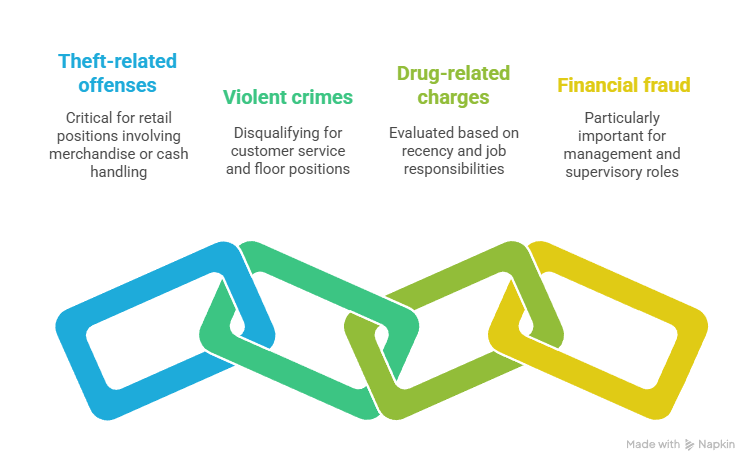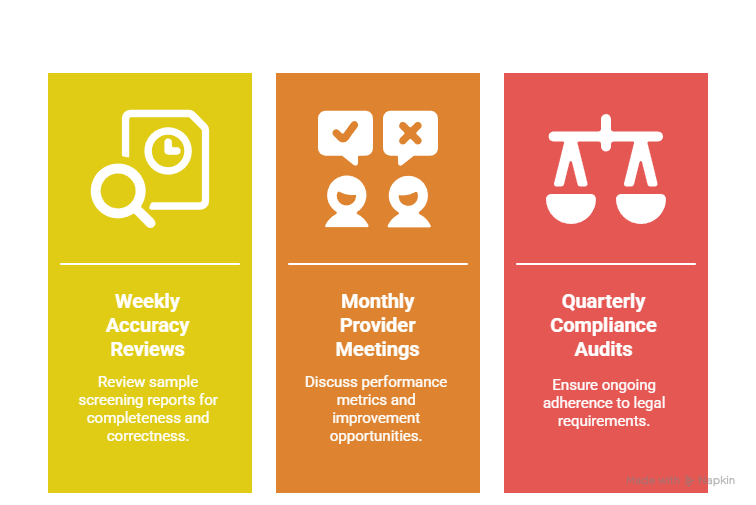Retail seasonal hiring background checks require strategic timing and streamlined processes to meet Black Friday staffing demands. Most successful retailers begin screening protocols 8-12 weeks before peak season.
Key Takeaways
- Start retail seasonal hiring background checks 8-12 weeks before Black Friday to allow adequate processing time and candidate selection.
- Implement tiered screening protocols that prioritize essential checks like criminal history and employment verification for faster turnaround times.
- Utilize technology-driven background check platforms that offer real-time updates and automated compliance reporting for seasonal retail worker requirements.
- Establish clear communication channels with screening providers to expedite fast retail background checks during peak hiring periods.
- Develop contingency hiring pools with pre-screened candidates to address last-minute staffing needs and seasonal employee turnover.
- Ensure all Black Friday hiring background checks comply with federal and state employment laws, including ban-the-box legislation and FCRA requirements.
Understanding Retail Seasonal Hiring Background Checks
Retail seasonal hiring background checks differ significantly from traditional employment screening. The compressed timeline creates unique challenges for HR departments. Fast retail background checks must balance thoroughness with speed to meet Black Friday deadlines.
Seasonal retail worker requirements focus on essential safety and security factors. Criminal background checks take priority over extensive employment history verification. Most retailers streamline their screening process to focus on job-relevant information only.
The volume of applications during holiday retail employee screening can overwhelm standard HR processes. Technology solutions become essential for managing hundreds of applications simultaneously. Automated systems help maintain consistency while reducing manual processing time.
Timeline Strategy for Black Friday Hiring Background Checks
Smart retailers begin their Black Friday hiring background checks in early August. This early start prevents last-minute staffing shortages during peak season. The timeline must account for background check processing delays and candidate availability.
The optimal approach divides into three phases: recruitment, screening, and selection. Initial recruitment starts 12 weeks before Black Friday to build a large candidate pool. Intensive screening occurs 8-10 weeks prior when most background checks are processed. Final selection happens 6 weeks before to allow time for training and onboarding.
Successful retailers also maintain backup candidate pools throughout the process. These pre-screened individuals can fill last-minute openings or replace no-show employees. The backup strategy proves crucial when seasonal employees quit without notice.
Essential Screening Components for Holiday Retail
Criminal Background Verification Requirements
Criminal background checks form the foundation of seasonal retail worker requirements. These checks focus on offenses that could impact workplace safety or customer security. Most retailers examine seven years of criminal history unless state laws restrict this timeframe.
Modern screening approaches evaluate job-relatedness when reviewing criminal records. Financial crimes carry more weight for cashier positions than for stockroom workers. Violent offenses typically disqualify candidates for customer-facing roles regardless of the specific position.

- Theft-related offenses: Critical for all retail positions involving merchandise or cash handling
- Violent crimes: Disqualifying for customer service and floor positions
- Drug-related charges: Evaluated based on recency and job responsibilities
- Financial fraud: Particularly important for management and supervisory roles
Automated flagging systems help HR teams quickly identify criminal history. This technology speeds up the approval process for candidates with clean records.
Employment History Verification
Employment verification confirms candidate reliability and work ethic before seasonal hiring. This process becomes essential during Black Friday hiring background checks when dependability matters most. Reference checks often reveal performance patterns that predict seasonal success.
Streamlined verification focuses on the most recent two employers to reduce processing time. Digital platforms can verify employment dates and rehire eligibility within 24-48 hours. Some retailers skip detailed reference calls for entry-level seasonal positions.
Identity and Eligibility Confirmation
Social Security number traces verify candidate identity and reveal potential name variations. This check helps ensure accurate criminal background screening results. Employment eligibility verification through I-9 compliance remains mandatory for all seasonal hires.
Address history verification helps confirm the candidate's residential stability and identifies jurisdictions for criminal searches. Multi-state searches become necessary for candidates who have moved frequently. This information ensures comprehensive background screening coverage.
Technology Solutions for Fast Processing
Automated screening platforms revolutionize retail seasonal hiring background checks through instant database access. AI-powered systems can process basic criminal checks within hours instead of days. These platforms integrate with applicant tracking systems for seamless workflow management.
Real-time status updates keep hiring managers informed throughout the screening process. Mobile-friendly interfaces allow candidates to complete requirements from smartphones or tablets. Digital consent forms and document uploads eliminate paperwork delays that slow traditional screening.
Cloud-based solutions scale automatically during peak hiring periods without additional IT infrastructure. Analytics dashboards help HR teams track screening metrics and identify bottlenecks. Integration capabilities connect screening results directly to payroll and onboarding systems.
Legal Compliance for Seasonal Background Screening
FCRA Compliance Standards
Fair Credit Reporting Act requirements apply to all retail seasonal hiring background checks regardless of employment duration. Retailers must provide standalone disclosure documents before conducting any screening. Written authorization from candidates is mandatory and cannot be combined with job applications.
Pre-adverse action procedures protect candidate rights when background checks reveal disqualifying information. Employers must provide background report copies and allow dispute periods before final decisions. These waiting periods can impact tight seasonal hiring timelines.
| Compliance Step | Timeline | Required Documentation |
| Initial Disclosure | Before screening | Standalone FCRA notice |
| Authorization | Before screening | Signed consent form |
| Pre-adverse Action | Before rejection | Background report copy |
| Final Adverse Action | After waiting period | Final decision notice |
FCRA violations can result in significant financial penalties and class-action lawsuits. Automated compliance tracking helps ensure proper procedures are followed consistently.
State-Specific Employment Laws
Ban-the-box legislation in many states prohibits criminal history questions during initial applications. This restriction requires retailers to adjust their screening timelines for holiday retail employee screening. Some jurisdictions also limit the types of criminal records that can influence hiring decisions.
Credit check restrictions vary significantly between states and may prohibit such screening for most retail positions. Salary history bans in certain states prevent asking about previous compensation during interviews. Multi-state retailers must comply with the most restrictive applicable laws.
Cost Management and Volume Discounts
Smart budget planning helps retailers optimize their seasonal screening investments without compromising quality. Volume pricing negotiations can reduce per-candidate costs by 20-30% for large hiring initiatives. Annual contracts often provide better rates than seasonal-only arrangements.
Tiered screening approaches match background check depth to position requirements and risk levels. Entry-level positions might only need criminal checks while supervisory roles require comprehensive screening. This strategy maintains appropriate risk management while controlling costs.
- Basic Package ($15-25): Criminal check and SSN trace for low-risk positions
- Standard Package ($25-40): Basic plus employment verification for cash-handling roles
- Premium Package ($40-60): Comprehensive screening for management positions
Technology investments in automated platforms reduce long-term administrative costs despite higher upfront expenses. These systems improve candidate experience and reduce dropout rates during the application process.
Quality Control and Screening Accuracy
Verification and Audit Procedures
Systematic quality control ensures background check accuracy before making final hiring decisions. Random audits should examine 10-15% of completed reports to identify errors or missing information. These reviews help maintain screening provider accountability and consistent standards.
Documentation requirements include maintaining complete records of all screening decisions and rationales. Standardized criteria help ensure consistent application of background check standards across all candidates. This documentation proves essential during potential legal challenges or discrimination claims.

- Weekly accuracy reviews: Sample screening reports for completeness and correctness
- Monthly provider meetings: Discuss performance metrics and improvement opportunities
- Quarterly compliance audits: Ensure ongoing adherence to legal requirements
Continuous improvement processes help identify and resolve screening bottlenecks before they impact hiring timelines. Regular training keeps HR staff updated on compliance requirements and best practices.
Post-Hire Monitoring Options
Some retailers implement ongoing monitoring programs that alert them to new criminal activity during employment. These systems can identify security risks but must comply with state notification requirements. Cost-benefit analysis helps determine value for temporary seasonal positions.
Employee handbook policies should clearly communicate screening standards and any ongoing monitoring procedures. Transparency helps set appropriate expectations while protecting the company's legal position.
Building Effective Screening Partnerships
Successful holiday retail employee screening depends on strong relationships with qualified background check providers. Evaluate potential partners based on surge capacity handling, guaranteed turnaround times, and retail industry experience. The best providers offer dedicated seasonal support and flexible service scaling.
Service level agreements should specify performance standards, escalation procedures, and rush processing options. These contracts protect retailers from service disruptions that could impact Black Friday staffing levels. Regular performance reviews maintain accountability and identify improvement opportunities.
Communication protocols must address how providers handle questions, disputes, and urgent requests during peak periods. Dedicated support channels and extended customer service hours become crucial when processing hundreds of checks weekly. Clear escalation paths ensure complex cases receive appropriate attention without delaying routine processing.
Training and Implementation Best Practices

HR Team Preparation
Staff training ensures consistent application of screening standards across all seasonal hiring activities. HR teams need clear guidelines for evaluating background check results and making hiring decisions. Decision trees help standardize responses to common screening scenarios.
Training modules should cover legal compliance requirements, screening provider procedures, and documentation standards. Role-playing exercises help staff practice handling difficult situations like explaining adverse actions to candidates. Regular updates keep teams informed about changing laws and regulations.
Candidate Communication Strategies
Clear communication with seasonal candidates helps set proper expectations about the background check process. Transparency about timelines and requirements reduces candidate anxiety and improves completion rates. Automated status updates keep applicants informed throughout screening without overwhelming HR staff.
FAQ documents should address common candidate concerns about background checks and their rights under federal law. Multiple communication channels including email, text, and phone support accommodate different candidate preferences. Prompt responses to questions help maintain candidate engagement during the screening process.
Contingency Planning for Seasonal Hiring
Backup hiring strategies become essential when background checks reveal disqualifying information about preferred candidates. Pre-screened candidate pools provide immediate alternatives without restarting the entire screening process. These contingency plans help maintain adequate staffing levels despite last-minute changes.
Alternative staffing solutions might include partnering with temporary agencies that maintain pre-screened worker pools. Some retailers develop relationships with previous seasonal employees who performed well. Early outreach to past successful hires can secure commitments before competitors begin recruiting.
Emergency hiring protocols address situations where immediate staffing needs arise close to Black Friday. Expedited screening procedures focus on essential safety checks while deferring less critical verifications. These protocols balance risk management with operational necessities during critical periods.
Measuring Success and ROI
Performance metrics help retailers evaluate the effectiveness of their Black Friday hiring background checks. Key indicators include screening completion rates, time-to-hire, and seasonal employee retention. These measurements guide improvements for future seasonal hiring cycles.
Cost-per-hire calculations should include background check fees, administrative time, and technology platform expenses. Comparing these costs against employee performance and retention helps justify screening investments. Quality metrics examine the correlation between screening thoroughness and employee success.
| Metric Category | Key Performance Indicator | Target Range |
| Speed | Average screening completion | 3-5 business days |
| Quality | Candidate acceptance rate | 85-95% |
| Compliance | Audit success rate | 98-100% |
Return on investment analysis compares screening costs against losses from problematic hires. Prevention of theft, customer complaints, and workplace incidents justify comprehensive background checking programs. Long-term benefits include improved brand reputation and customer confidence.
Conclusion
Retail seasonal hiring background checks require careful planning and execution to support successful Black Friday operations. Starting the process 8-12 weeks early provides adequate time for thorough screening while maintaining candidate engagement. Technology solutions and strong provider partnerships enable fast retail background checks without sacrificing accuracy. Compliance with federal and state laws protects retailers while ensuring fair treatment of seasonal candidates.
Frequently Asked Questions
How far in advance should retailers start seasonal background checks for Black Friday hiring?
Retailers should begin seasonal background checks 8-12 weeks before Black Friday to ensure adequate processing time and candidate selection. This timeline allows for thorough screening while accommodating potential delays or the need to find replacement candidates.
What are the most important background check components for seasonal retail workers?
The most essential components include criminal background verification, employment history confirmation, and Social Security number trace verification. These core elements help identify potential risks while maintaining cost-effectiveness for temporary positions.
How can retailers speed up the background check process during peak hiring?
Retailers can accelerate screening through automated platforms, tiered screening approaches that prioritize essential checks, and pre-negotiated service level agreements with screening providers that guarantee faster turnaround times during peak periods.
What legal compliance issues should retailers consider for seasonal hiring background checks?
Key compliance considerations include FCRA requirements for disclosure and authorization, state-specific ban-the-box legislation, credit check restrictions, and proper adverse action procedures when background checks reveal disqualifying information.
How much do seasonal retail background checks typically cost?
Seasonal retail background checks typically range from $15-60 per candidate depending on the screening level, with basic criminal checks starting around $15-25 and comprehensive screening packages reaching $40-60 per candidate.
Can retailers use different screening standards for seasonal versus permanent employees?
Yes, retailers can implement different screening standards for seasonal workers as long as the criteria are job-related, consistently applied, and comply with applicable employment laws. Many retailers use streamlined screening for temporary positions while maintaining comprehensive checks for permanent roles.
Additional Resources
- Fair Credit Reporting Act Compliance Guide for Employers
https://www.ftc.gov/business-guidance/resources/using-consumer-reports-what-employers-need-know - EEOC Guidelines on Criminal Background Screening
https://www.eeoc.gov/laws/guidance/arrest-conviction-records-employment-decisions-under-title-vii-civil-rights-act-1964 - State-by-State Ban-the-Box Legislation Overview
https://www.nelp.org/campaign/ensuring-fair-chance-work/ - Retail Industry Background Screening Best Practices
https://www.nrf.com/topics/loss-prevention/background-screening - Seasonal Employment Law Considerations
https://www.shrm.org/topics-tools/news/seasonal-employment-considerations

GCheck Editorial Team
Meet the GCheck Editorial Team, your trusted source for insightful and up-to-date information in the world of employment background checks. Committed to delivering the latest trends, best practices, and industry insights, our team is dedicated to keeping you informed.
With a passion for ensuring accuracy, compliance, and efficiency in background screening, we are your go-to experts in the field. Stay tuned for our comprehensive articles, guides, and analysis, designed to empower businesses and individuals with the knowledge they need to make informed decisions.
At GCheck, we're here to guide you through the complexities of background checks, every step of the way.





